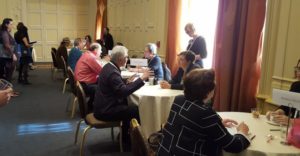
Mark Hopkins Hotel, San Francisco
I just returned from a writer’s conference in San Francisco (https://sfwriters.org/), which was a decent conference with fairly high-level sessions, not Bonehead 101 as so many of them are.
I had four days in the Mark Hopkins hotel at the top of Nob Hill, a very classy joint. It’s a hundred years old and a little dowdy for that, but in an elegant way. Elegant-dowdy is a thing, I believe.

Chief Engineer Shane Caldwell at the Mark Hopkins
Unfortunately the hotel does not have another 100 years ahead of it — the probability of a devastating earthquake in the next 25 years is 99.7% — near certainty. Even so, I was impressed by a tour of the hotel’s innards, offered by the chief engineer. They’ve streamlined their energy conservation and waste-handling impressively, using slick electronic monitoring and data analysis tools that sit alongside hulking steam boilers from another era.

“Chinatown” in San Francisco
I walked through “Chinatown” (which is multi-ethnic) on New Year’s Eve (Feb 15th) and that was a colorful, fragrant, and noisy experience. On the other side of that district, I emerged at the iconic City Light Books where I spent way too much money (“Howl if you love City Lights”).
The SF MOMA was slightly disappointing. Despite its sparkling new facility, it felt backwards-looking. “Modern” art seems to mean mid-twentieth-century American and European classics. Ho-hum. That’s not modern any more, you guys. The De Young display of “craft” art from Oceana was more interesting. And modern, too.

Pitchers Pitching
But I had to rush back to the conference, which was so dense that it didn’t leave much free time for sight-seeing. The main reason I went was to participate in the “speed-dating” which really means “speed pitching.”
Hordes of aspiring writers are released into a ballroom where literary agents sit at tiny tables around the perimeter. Like bees in a field, the writers swarm the agents for an hour to suck their nectar. You get three minutes with each agent to pitch your book. When the bell rings, you must immediately stop talking and get out of the chair or you would be stung to death by the bees lined up behind you.
If you’re lucky, the agent hands you a business card and says “Send me some pages.” If your pitch fell flat, the agent smiles and says something kind, but it includes the phrase, “…it’s not for me.”

Listening for Aliens
The day before the speed-pitching session, I took a meeting with an agent, not a pitch session, but a 15-minute consultation, a chance to talk to the mythical beast in a humane way. I described my latest project, rogue AI bots on the internet, and she declared it was not sci-fi. I was writing literary, she said. Sci-fi readers want kinetic action and obvious tropes, like Star Wars. Conceptual, theme-driven writing is literary, she asserted. “You need to own it.”
She was right. I am not interested in robots, aliens or space ships. I use them only as contrast devices to dramatize ideas about the nature of human consciousness. I read sci-fi but I don’t like it much. Usually it is badly written and most of it is pointless (though certainly kinetic), and a lot of it drifts into fantasy, far from any plausible science. I don’t want to be a sci-fi writer, despite the robots, so does that have to be my prison? No.
Exhilarated by new possibilities, I gave up my sci-fi career and became a literary writer on the spot. I felt a huge sense of relief and freedom. I thanked the agent profusely. Best $50 I ever spent. I was a literary writer!
But the mood didn’t last. Thinking about it later that evening, doubt began to creep in. I couldn’t sell literary fiction with robots in it. That wouldn’t fly on a plasma-beam. And then I looked up the agent I had interviewed and learned that she explicitly does not represent sci-fi. Hmm.
At the speed-pitching session next morning I could not resist pitching a literary novel. I do have one – real literary, no robots, and my 90-second pitch was polished. I pitched it twice and got blank faces and wandering eyes. Maybe it was a bad pitch. It didn’t seem like it to me, but the sound of a flop is “flop.”
Enough of that, I thought. I had been a literary writer for twelve hours. I was better off as a reluctant sci-fi writer.
I pitched my sci-fi novel to the next three agents and got three business cards. I’ve now sent out my queries, synopses, and sample chapters. I still have a few active queries out from another recent conference, so I’ll get back to work on my tenth novel while I wait. Compared to the mysteries of selling, writing is a walk in the park.
